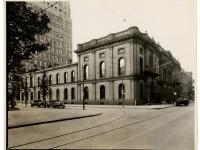Answer: The Philadelphia Savings Fund Society
To Americans today, a savings bank is simply another financial institution, indistinguishable from commercial banks. But to Americans in the 19th century, savings banks embodied something entirely distinct and unique. In an advertisement in Freeman’s Journal, savings banks embodied “a promotion of economy and the practice of saving amongst the poor and laboring classes… to render them independent of the bounty of others.”
The Philadelphia Savings Fund Society (PSFS) was founded in 1816, modeled upon similar institutions prevalent in Europe. Unlike traditional banks, PSFS was designed to handle only interest-accruing savings accounts, accounts that could be easily utilized by the depositor during times of need. The bank accepted deposits of as little as one dollar, offering an accessible vehicle for financial saving and investing for Philadelphians of modest means. Savings banks grew in popularity and became symbols of the Thrift Movement, which supported saving and moderation in all aspects of life. By the early 1830s, nearly 10 percent of the city’s population had accounts with PSFS.
PSFS was originally established in a building on Sixth Street between Chestnut and Walnut Streets. Its headquarters moved several times until settling in at its final headquarters, Philadelphia’s PSFS skyscraper on Market Street, in 1932. PSFS went defunct in the 1990s.
The Historical Society of Pennsylvania has one of the largest historical collections about thrift. From now until February 27, the Society will display items from its collection related to the birth of the School Savings Bank movement, the ways in which thrift helped to win the world wars, and the many social and educational organizations that have shaped how we think about savings, spending, and giving. The display is free and open to the public during regular library hours.
HSP has in its library a host of publications from PSFS and other savings banks, as well as pamphlets associated with the Thrift Movement. We also have collections of manuscripts from many of the families of people involved in PSFS's founding, such as the Vauxs (#684), Morrises (#2000B), Peters (#499), Biddles (#1792), as well as the journals of Samuel Breck (#1887).

